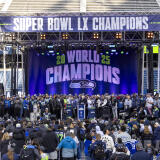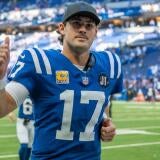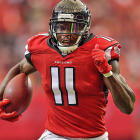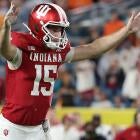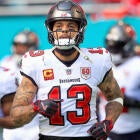2017 Super Bowl: Here's how much the Patriots, Falcons spend on each position
The Falcons pay a premium at QB and WR while the Patriots set the market ... at kicker

Super Bowl teams can be built under the salary cap in a variety ways. The Super Bowl participants after the 2012 season, the Ravens and 49ers, devoted significantly more of the cap to the defensive side of the ball. The Seahawks went to back-to-back Super Bowls in 2013 and 2014 with quarterback Russell Wilson's cap numbers being below $825,000. The 2011 Giants and 2013 Broncos had high-priced quarterbacks Eli and Peyton Manning.
The following graphic outlines the salary cap charges for the Falcons and Patriots' key contributors at each position and on special teams. It works out to 15 players each on offense and defense. Reserve list and dead money charges are thrown in for good measure. Dead money is a salary cap charge for a player that is no longer on a team's roster. The collective bargaining agreement's $195 daily amount for participating in a team's voluntary offseason workout program is included in the cap numbers.

Each NFL team's actual salary cap (known as adjusted salary cap) is typically different from the NFL's set amount because unused cap room can be carried over from one year to the next year and other adjustments can further increase or decrease cap space. The actual salary cap is currently $155.27 million. The Super Bowl participants are operating with almost the same adjusted salary caps. The Falcons' adjusted salary cap is $158.36 million while the Patriots' is $160.2 million.
Atlanta's cap spending is heavily weighted toward the offense. It's $67.3 million for offensive players to $29.3 million for defensive players. Nine of the Falcons' 15 main defensive contributors being on low-cost rookie contracts are primarily responsible for the discrepancy between the two sides of the ball.
New England allocates more of the cap to offense as well, but isn't as skewed as Atlanta. The breakdown is $55.05 million for offense and $42.99 million for defense.
Offensive breakdown
Quarterback
Matt Ryan has the NFL's third-highest cap number this season at $23,756,240. Although Ryan is under contract through the 2018 season, the Falcons are interested in working out a new deal with him during the offseason. Eclipsing Andrew Luck's offseason five-year extension, which reset the NFL pay scale, is a given for Ryan. Luck's contract averages $24.594 million per year and contains $87 million in guarantees, of which $47 million was fully guaranteed at signing.

Tom Brady's willingness to sign below-market contracts for the good of the Patriots hasn't started a trend among top-tier quarterbacks. Since becoming the NFL's highest-paid player in 2010 with a four-year, $72 million extension, Brady has renegotiated his contract twice to provide New England with cap relief. The new money Brady is scheduled to receive from these renegotiations compared to what he would have gotten had he played out his 2010 contract, which was set to expire after the 2014 season, is $71 million over five new contract years for an average of $14.2 million per year. To better put the figures in perspective, the average yearly salary for starting quarterbacks this season, including ones on rookie contracts, is approximately $14.7 million according to NFLPA data. Brady's cap number this season is about $10 million less than Ryan's.
Running back
Both teams have a minimal investment in running backs. LeGarrette Blount is one of the league's best veteran contract values. After languishing on the open market for about a month, he returned to the Patriots on a one-year, $1 million deal worth up to $2 million through incentives. Blount's career-high 1,161 rushing yards were the eighth most in the NFL this season. He also had an NFL-best 18 rushing touchdowns.

Atlanta's highly productive tandem of Devonta Freeman and Tevin Coleman are on rookie contracts. Their combined salaries are $1,167,500. Kristin Campbell, Freeman's agent, raised some eyebrows with ill-timed comments earlier in the week about how Freeman should be paid like an elite running back. As a 2014 draftee, Freeman, who is heading into his contract year, just became eligible to sign a new deal when the regular season ended on Jan. 1.
The Falcons and Patriots utilize a fullback more other NFL teams. James Develin (Patriots) and Patrick DiMarco (Falcons) have the second- and third-highest playtime percentage among the league's fullbacks at 31.31 percent and 31.08 percent but aren't among the top five in pay. The NFLPA puts the average yearly salary for fullbacks at just under $1.45 million. Each is signed to a one-year deal for less than $1 million.
Wide receiver
Julio Jones, a first-team All-Pro the past two seasons, has the NFL's biggest wide receiver salary cap number at $15,906,240. The five-year, $71.25 million extension (with $47 million in guarantees) Jones received in 2015 makes him the NFL's second highest-paid wide receiver.

Under head coach Bill Belichick, the Patriots haven't regarded particular wide receivers as indispensable to the team's success and it's reflected in their contracts. Julian Edelman is a tremendous bargain. He signed a four-year, $17 million deal (worth a maximum of $19 million with incentives) to return to New England when he couldn't generate much interest during free agency in 2014. Edelman is best known as a slot wide receiver but has proven to also be effective on the outside. He really should be among the highest-paid slot guys, which would put him over $10 million per year.
Tight end
The Patriots have overcome the late-season loss of four-time first-team All-Pro Rob Gronkowski to his third back surgery because of Martellus Bennett, who was acquired from the Bears in a March trade. Putting a franchise tag on Bennett, which should be $9.894 million with a $168 million 2017 salary cap, isn't out of the question due to Gronkowski's inability to stay healthy. Atlanta's tight end duo of Levine Toilolo and Austin Hooper are in a different salary stratosphere than Bennett because they are on rookie contracts.
Offensive line
Atlanta's fourth-, fifth- and sixth-biggest cap charges come from left guard Andy Levitre ($5,381,240), left tackle Jake Matthews ($4,487,013) and center Alex Mack ($4,056,240). Mack was one of the NFL's best free-agent signings. His five-year, $45 million contract containing $28.5 million in guarantees put him at the top of the center market until Travis Frederick's preseason extension with the Cowboys. Ryan Schraeder, who has arguably been the league's most consistent right tackle over the past two seasons, gave up a shot at free agency by signing a five-year, $31.5 million extension (worth up to $33 million through salary escalators) during the latter part of the regular season.

For New England, 90 percent of its starting offensive line cap charges come from tackles Marcus Cannon and Nate Solder. Solder's $10,672,656 cap hit is the NFL's third-biggest for an offensive lineman. Cannon's solid job filling in at right tackle for an injured Sebastian Vollmer earned him a five-year, $32.5 million extension shortly after Schraeder got his.
Defensive breakdown
Defensive end
Tyson Jackson and Brooks Reed have Atlanta's top defensive player cap charges of $6,356,240 and $3,446,240. Getting a second Super Bowl ring from a Falcons victory would be a perfect way for 36-year-old Dwight Freeney ($2,984,375 cap number) to end a tremendous 15-year career.
Chris Long jumped at the chance to play for the Patriots so he would have a shot at winning the Super Bowl after the Rams released him from a contract scheduled to pay him $11.5 million in 2016. He could have gotten more money elsewhere but took a modest one-year deal in which he's making $3 million after earning $500,000 in incentives. Jabaal Sheard's $6,942,960 cap number is New England's second-highest figure for a defensive player.

Defensive tackle
Both teams have nominal cap charges for interior defensive lineman with second-year players Malcolm Brown (Patriots) and Grady Jarrett (Falcons) on rookie deals. Alan Branch leads the way at $2.75 million for the Patriots.
Linebacker
Dont'a Hightower is responsible for a little more than half of New England's linebacker cap charges. The 2012 first-round pick's $7,755,875 cap number is the result of playing on a fifth-year option. Dealing Jamie Collins to the Browns as the Nov. 1 trading deadline approached was a surprising move that will impact New England's negotiations with Hightower, an impending free agent. Collins just signed a four-year deal averaging $12.5 million per year with $26.4 million fully guaranteed to remain in Cleveland. It's going to be hard for the Patriots to justify to Hightower that he should take less than the linebacker they traded away.
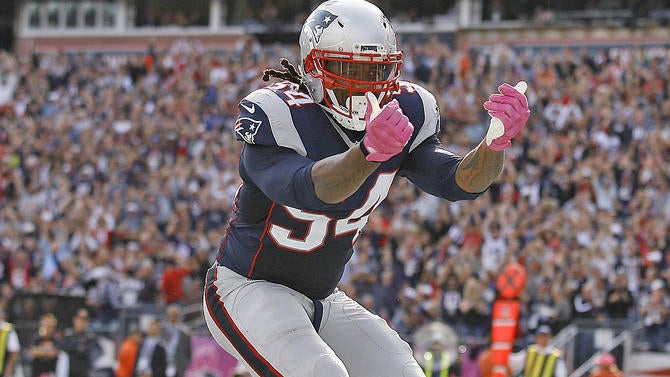
The collective cap hit for Atlanta's starting linebackers are about 60 percent of Hightower's number. Vic Beasley, De'Vondre Campbell and Deion Jones are 2015 and '16 draft picks. If Beasley's league-leading 15.5 sacks are a preview of things to come, his next contract could surpass Von Miller's six-year, $114.5 million deal with the Broncos containing $70 million in overall guarantees, which makes him the NFL's highest-paid non-quarterback at $19,083,333 per year. The earliest Beasley can get a new deal is after the 2017 season.
Cornerback
New England's cornerback cap charges are so low because Eric Rowe, Malcolm Butler and Logan Ryan are second-, third- and fourth-year players. Butler might be the best value in Super Bowl LI because he has been playing at a Pro Bowl level the past two seasons on a league minimum salary, which is currently $600,000. The Super Bowl XLIX hero is an impending restricted free agent. It might be necessary for the Patriots to put a first-round tender on Butler, which should be around $3.95 million, to prevent another team from signing him to an offer sheet.
Atlanta and New England's collective cornerback cap hits are similar but the contracts aren't. Robert Alford's late-season extension for $38 million over four years with $21 million in guarantees sets the market for No. 2 cornerbacks.
Safety
Devin McCourty rejected bigger offers from other teams to remain with the Patriots in 2015 by signing a five-year, $47.5 million contract that has $28.5 million in guarantees. He still has the NFL's fourth-richest safety contract. Only four NFL teams have smaller cap charges for starting safeties than Atlanta does with Ricardo Allen ($531,240) and Keanu Neal ($1,952,299), who are on rookie contracts.
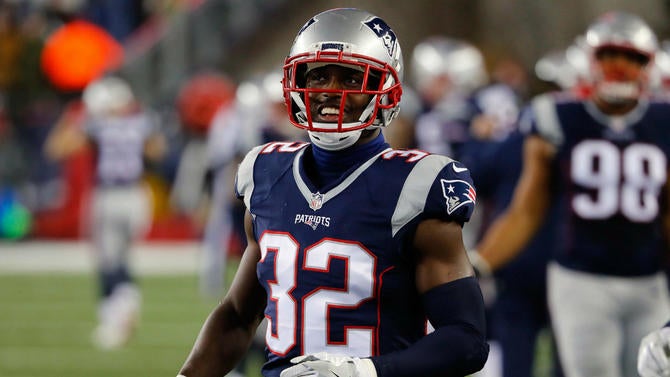
Special teams breakdown
New England's Stephen Gostkowski saw his field goal percentage drop to 84.4 percent after three straight seasons in the 90s. He also uncharacteristically missed three extra points. Nonetheless, Gostkowski is the NFL's highest-paid kicker with a $4.3 million average yearly salary. His $4,106,240 cap hit is third-highest for kickers. Atlanta's kicker & punter combination, Matt Bryant and Matt Bosher, have the league's fifth-highest collective kicking cap charge at almost $5.9 million.
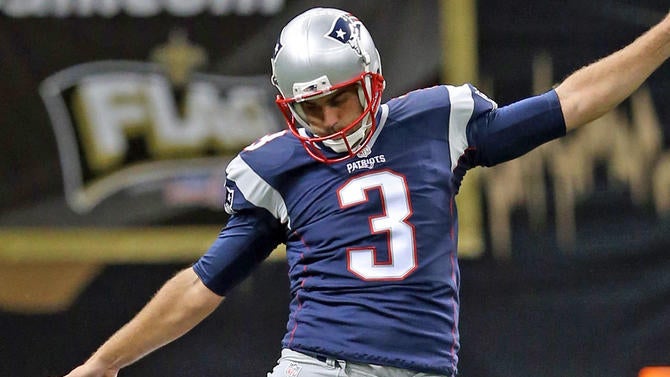
Reserve lists
Both teams have been bitten by the injury bug. The two-tight-end sets Belichick liked running pretty much went out the window when Gronkowski's back injury ended his season in November. Gronkowski ($6,624,990 cap number) was limited to just eight games because he was also slowed by an early-season hamstring problem.
Gronkowski was unhappy with the six-year, $54 million extension he signed in 2012 to become the NFL's highest-paid tight end by average yearly salary, prompting his agents, Drew and Jason Rosenhaus, to have a training camp meeting with New England's brass about giving him a new deal. The chances of him getting a new deal seemed remote since he is already under contract through the 2019 season. His lack of durability probably puts an end to the idea. Vollmer ($5,214,574 cap number) was slated to become an unrestricted free agent, but his contract is probably tolling because he spent the entire season on the physically unable perform list with shoulder and hip problems.
The Falcons are without their best cornerback, Desmond Trufant. He has been sidelined since Week 10 with a torn pectoral muscle. Extending his contract will likely be an offseason priority since he is scheduled to play his contract year on an $8.026 million fifth-year option. Atlanta will soon have one of the NFL's highest-paid cornerback tandems because the 2015 Pro Bowl pick's new deal will be significantly more than Alford's.
Defensive line depth took a hit with Adrian Clayborn tearing a biceps against the Seahawks in the divisional playoffs. A midseason torn Achilles had already claimed Derrick Shelby. Both are signed to deals averaging in the $4.25 million to $4.5 million range. Starting tight end Jacob Tamme, whose two-year deal is expiring, was also lost eight games into the season because of a shoulder injury.
Dead money
Dead money exists because of how salary cap accounting rules operate. Signing bonuses, option bonuses and certain roster bonuses are prorated or spread out evenly over the life of a contract for a maximum of five years. When a player is released, traded or retires, the remaining proration of these salary components immediately accelerates onto his team's current salary cap.
There are two major exceptions to this general rule of bonus proration accelerating. Only the current year's proration counts toward the salary cap with transactions occurring after June 1. The bonus proration in future contract years is delayed until the following season. A team can also release two players each year before June 1 (known as a Post-June 1 designation) that will be treated under the salary cap as if they were released after June 1. With a post-June 1 designation, a team is required to carry the player's full cap number until June 2 even though he is no longer a part of the roster. The player's salary comes off the books at that time unless it is guaranteed.
This means dead money is typically a sunk cost where money isn't owed to a player. Only if there are salary guarantees when a player is released will there be a payment associated with dead money.
The Falcons rank in third in the NFL in dead money, which is unusual for a Super Bowl team. Tackle Sam Baker, who was released in June 2015, is responsible for the most dead money. His cap charge is $6.4 million. There's a $3.9 million cap charge for releasing guard Jon Asamoah late in the 2015 season. Letting wide receiver Roddy White, Atlanta's all-time leader in receptions, receiving yards and touchdown catches, paved the way for Mohamed Sanu signing a five-year, $32.5 million deal at the start of free agency. White's dead money is $3.775 million. The Falcons gained $2,362,500 of cap room from cutting White in March. Safety William Moore's February release produced $3.3 million in dead money.
New England only has one dead money amount in the same neighborhood as Atlanta's biggest ones. Linebacker Jerod Mayo's retirement after the 2015 season has left a $4.4 million cap charge. Trading edge rusher Chandler Jones to Arizona didn't produce any dead money because his only cap charge was his option year base salary of $7.799 million. However, New England has a cap charge of slightly more than $1.875 million on the books for guard Jonathan Cooper (seventh overall pick in the 2013 draft), who was acquired in the Jones trade, from releasing him during the middle of the season.


